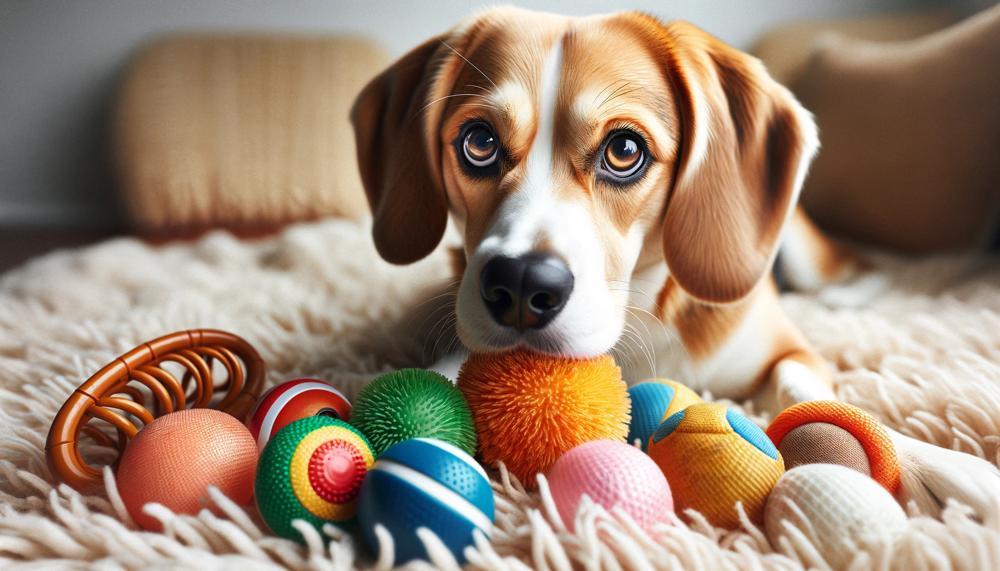Imagine this: after a long day of work, you finally make it home and all you want to do is unwind. But your furry companion has other plans – they greet you with an excited tail wag and a playful look in their eyes, begging for your attention. So, why does my dog want to play all the time?
Dogs often want to play all the time for several reasons:
- Exercise and Energy Levels: Dogs, especially young ones and high-energy breeds, have a lot of energy that they need to burn off. Playing is an excellent way for them to do this.
- Attention and Bonding: Dogs enjoy being around their owners and playing is a way for them to interact and bond with you.
- Mental Stimulation: Playtime provides dogs with the mental stimulation they need. Dogs that are under-exercised, bored, or don’t get enough attention can become clingy and want to play more.
- Breed-Specific Traits: Some breeds are naturally more energetic and playful than others. For example, working breeds like Border Collies, German Shepherds, and Huskies were bred for jobs that involve lots of mental stimulation and physical exercise.
So, grab a toy or two, because we’re about to embark on an adventure into the world of canine play.
Reason 1: You Have A High Energy Dog Or A Puppy
Table of Contents
- 1 Reason 1: You Have A High Energy Dog Or A Puppy
- 2 Reason 2: Not Enough Exercise
- 3 Reason 3: Not Enough Mental Stimulation
- 4 Reason 4: You Have Been Rewarding The Behavior
- 5 6 Ways To Manage This Behavior
- 6 Should I Be Worried If My Dog Wants to Play All The Time?
- 7 Why Does My DogOnlyWant To Play With Me?
- 8 Conclusion
There are numerous strategies to satisfy your high energy dog or puppy and prevent them from constantly seeking attention.
These include regular exercise, mental stimulation, engaging in activities together, exposing them to new experiences, investing in interactive toys, and sticking to a routine.
By incorporating these techniques into your daily schedule, you can keep your dog entertained and curb their excessive playfulness.
| Strategy | Description |
| Regular exercise | Ensure your dog receives enough physical activity through daily walks, runs, or playing fetch. |
| Mental stimulation | Provide your dog with training sessions, puzzle toys, and interactive games to tire out their mind. |
| Engaging in activities together | Bond with your furry friend by playing tug-of-war, hide-and-seek, or teaching them new tricks. |
| New experiences | Expose your dog to novel environments and experiences such as hikes or trips to the beach. |
| Interactive toys | Invest in puzzle feeders or treat-dispensing toys to keep your dog occupied for extended periods. |
| Establishing a routine | Create a schedule for meals, walks, and playtime to provide structure for your dog’s day. |
It is essential to note that the level of exercise and mental stimulation required may vary depending on your dog’s breed, age, and overall health.
Consult with your veterinarian to determine the appropriate amount of activity for your high energy canine companion.
Reason 2: Not Enough Exercise
Dogs are naturally active creatures, and when they don’t get enough exercise, it can lead to a constant desire to play. This can result in boredom, restlessness, and hyperactivity, as they try to find ways to release pent-up energy. Without proper exercise, dogs may resort to excessive playfulness as a way to alleviate their feelings of boredom.
Moreover, a lack of physical activity can also contribute to weight gain in dogs. This can make it challenging for them to engage in physical activities and lead to a vicious cycle of inactivity and playfulness. To break this cycle and keep your dog healthy, regular exercise is crucial.
Not only does exercise help burn off excess energy, but it also promotes mental stimulation and the release of feel-good hormones. This makes dogs less likely to seek attention through play and more content with simply relaxing or napping. So, when your dog is acting out with excessive playfulness, it could be a sign that they need more exercise in their routine.
To ensure your dog gets enough exercise, make sure to provide them with daily walks, runs, or playtime. You can also mix things up by taking them on different routes or engaging them in new activities like agility training or swimming.
Reason 3: Not Enough Mental Stimulation
Not providing enough mental stimulation for your dog can lead to boredom and unwanted behaviors, such as excessive play, chewing, digging, and barking.
In order to better understand how this happens, let’s take a closer look at the effects of mental stimulation on our canine companions.
| The Impact of Mental Stimulation on Dogs | ||
| Boredom and Undesirable Behaviors | Regular mental stimulation is key to preventing boredom in dogs and reducing the likelihood of them engaging in destructive behaviors, such as chewing, digging, and excessive barking. | |
| Breed-Specific Needs | As owners, it is crucial to understand our dog’s breed and individual needs for mental stimulation. Different breeds may require varying levels of mental engagement to stay happy and healthy. | |
| Behavioral Issues and Trainability | Regular mental stimulation can also help prevent behavioral issues in dogs and promote better trainability. A mentally stimulated dog is more likely to listen to commands and be receptive to training. | |
| Healthy Development in Puppies | Providing regular mental stimulation is essential for the healthy development of young puppies. It helps them learn new things, develop problem-solving skills, and improve cognitive health. | |
| Preventing Premature Aging and Cognitive Decline | Mental enrichment throughout a dog’s life can help prevent premature aging and cognitive decline. Keeping their minds active can slow down the aging process and promote overall well-being. | |
| Reducing Stress and Separation Anxiety | Regular mental stimulation can also help reduce stress and separation anxiety in dogs. It keeps their minds occupied and happy, making them less likely to develop destructive behaviors when left alone. | |
| Redirecting Hyperactive Behavior | Dogs with high energy levels can benefit from various forms of mental stimulation to redirect their hyperactive behavior. This can include puzzle toys, training exercises, and interactive playtime. | |
| Bonding with Owner | Engaging in mentally stimulating activities with your dog not only benefits their well-being but also strengthens the bond between owner and pet. It is a great way to spend quality time together. |
Reason 4: You Have Been Rewarding The Behavior
There are several rewards that may unknowingly reinforce a dog’s persistent desire to play, such as attention and affection, treats, verbal praise, interactive toys, and inconsistency in rewarding their behavior. These actions may seem harmless, but they can actually be contributing to your dog’s constant demand for playtime.
For instance, giving your dog attention and affection whenever they demand it may seem like a loving gesture, but it can actually reinforce their behavior. They learn that by barking or jumping on you, they will receive the attention they crave. This can lead to even more demanding behavior in the future.
Similarly, giving your dog treats or verbal praise every time they beg for playtime can also unintentionally reward their behavior. They begin to associate asking for play with receiving rewards, making them even more determined to continue this behavior.
Interactive toys can also play a role in reinforcing your dog’s desire for play. If you always give in and play with them whenever they bring you a toy, they learn that this is an effective way to get what they want. This can lead to excessive barking or whining when they want to play.
Lastly, inconsistency in rewarding your dog’s behavior can also contribute to their constant desire for play.
If you sometimes give in and play with them when they demand it, but other times ignore them, it creates confusion for your dog. This inconsistency can lead to persistent begging for playtime as they try to figure out what will work to get your attention.
6 Ways To Manage This Behavior
- Facilitate ample physical and mental stimulation: Dogs are naturally active creatures and require plenty of physical exercise to stay healthy and content. Taking your dog for daily walks or engaging in activities such as playing fetch or tug-of-war can help tire them out and diminish their constant desire to play.
- Utilize positive reinforcement: Instead of reprimanding your dog for being overly playful, try using positive reinforcement techniques. This involves rewarding good behavior with treats or praise and ignoring any undesirable behavior. Overtime, your dog will learn that being calm and well-behaved results in positive attention.
- Avoid unintentionally reinforcing the behavior: It’s crucial to be mindful of your actions when managing a dog’s constant desire to play. Giving attention or scolding your dog when they misbehave can actually reinforce the behavior, as any form of attention is still attention in the eyes of a dog.
- Establish clear boundaries: Dogs thrive on structure and routine, so it’s essential to set clear boundaries and consistently enforce them. This can include designated play times and designated quiet times where the dog is expected to relax.
- Be patient: It’s important to remember that changing a behavior takes time and patience. Be consistent with your training methods and give your dog time to adjust to new routines. With patience, you will see progress over time.
- Address underlying issues: If your dog’s constant need for attention is due to boredom, separation anxiety, or insecurity, it’s important to address these underlying issues as well. Providing enough mental stimulation and addressing any underlying anxieties can help alleviate the constant desire to play.
To sum it up, managing a dog’s constant desire to play requires patience, consistency, and understanding of the underlying reasons behind the behavior. By providing enough exercise, using positive reinforcement, setting clear boundaries, and addressing any underlying issues, owners can create a more balanced and tranquil environment for their furry friend.
Should I Be Worried If My Dog Wants to Play All The Time?
A dog wanting to play all the time is not typically a sign of a health crisis. However, it could indicate that your dog is not getting enough exercise, mental stimulation, or attention. Here are some reasons why you might need to pay attention:
- Inadequate Exercise: Depending on your dog’s breed, it may require significantly more activity than it is currently receiving.
- Inadequate Attention: Your dog may want to play all the time because you’re not giving it enough attention when you are supposed to.
- Inadequate Mental Stimulation: Your dog may require lots of mental stimulation. You can make it work for its food, teach it new tricks, or maybe get it a puzzle toy.
- Insecurity Issues: Dogs who seek lots of attention might be suffering from insecurity issues. Therefore, being around their owner makes them feel safer and more comfortable.
If your dog’s desire to play becomes disruptive or exhausting, it might be a good idea to consult with a professional dog trainer or a veterinarian. They can provide guidance tailored to your dog’s specific needs.
Remember, play is an important part of a dog’s life and contributes to their physical health and emotional well-being.

So, while it’s important to manage excessive play, it’s also crucial to ensure your dog gets enough playtime.
Why Does My DogOnlyWant To Play With Me?
There are numerous possible explanations as to why your dog may only want to play with you and not other people. Some of these reasons include:
- Bonding and attachment: Dogs are highly social animals and form strong bonds with their owners. If your dog prefers to play with you, it could be a sign of a deep connection and attachment between the two of you.
- Familiarity: Dogs are creatures of habit and tend to favor familiar people and environments. If your dog is accustomed to playing with you, it may feel more at ease and confident engaging in play with you rather than others.
- Lack of socialization: Socialization is crucial for dogs to learn how to interact with others, both dogs and humans. If your dog has not been properly socialized, it may not know how to play with other people or dogs.
- Insufficient exercise: Dogs require regular physical activity to stay healthy and happy. If your dog is not getting enough exercise, it may have excess energy that it wants to release through play, causing it to turn to you as its main source of playtime.
- Reinforced behavior: Sometimes, owners unintentionally reinforce certain behaviors in their dogs by giving them attention or treats when they engage in those behaviors. If your dog has learned that it can receive attention or rewards by constantly asking you to play, it may continue doing so.
- Negative past experiences: If your dog has had negative encounters with other people or dogs during playtime, it may be hesitant to interact with them in the future. This could lead to a preference for playing with you instead.
To ensure that your dog is well-rounded and able to interact and play with others, it is important to provide proper socialization, exercise, and mental stimulation.
Establishing boundaries and reinforcing desired behaviors can also be beneficial in preventing excessive demands for playtime from your dog.
Conclusion
In conclusion, dogs have an innate inclination towards playfulness that is essential for their growth and well-being. As responsible pet owners, understanding the reasons behind this behavior is crucial in managing it effectively.
Providing ample physical and mental stimulation, setting boundaries, and addressing any underlying issues can help create a more balanced and harmonious relationship between owner and pet. By incorporating these strategies into your daily routine with your furry friend, you not only ensure their happiness, health, and entertainment but also strengthen your bond with them.






